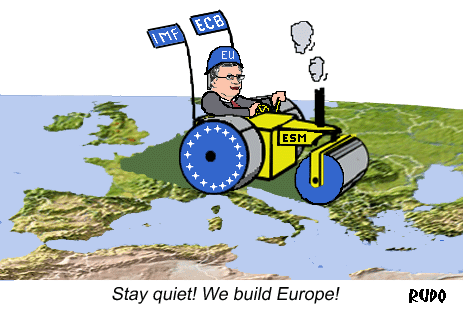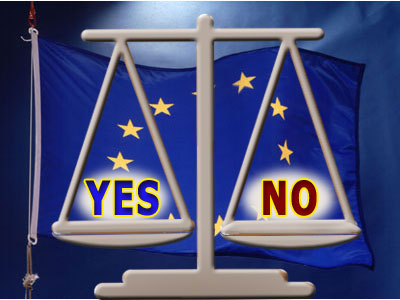Democrat May-June 2012 Editorial (Number 129)
What is to happen?

The objective of euro-federalists and especially the German government to save the euro is to utilise two new treaties which would be enable by an amendment to the EU Constitution. If the two new treaties and constitutional amendment are ratified the result would be a fiscal and political union. This would be confined to the 17 eurozone States and turn the EU into a two tier affair dominated by Germany, with support from French and British governments.
The Fiscal Compact was the first of these treaties to get a public airing during the recent referendum in Ireland on 31 May. The No! Side made crystal clear this would be ratifying a Permanent Austerity Treaty.
The Irish government told plain lies to frighten their electorate to vote Yes! Ministers said Ireland would not get the loan promised to save the banks. The monies available are not tied to any stipulation about ratifying the Fiscal Pact to receive the loan. The 40% No! votes in this referendum were cast by working class districts who suffer most from the austerity policies imposed on Ireland.
The other treaty is the European Stability Mechanism (ESM) which need only be ratified by 12 eurozone States. The ESM would require each eurozone State to contribute to a permanent eurozone loan fund of £400 billion. For instance Ireland, although broke, would have to contribute £9 billion . The ESM would establish the Economic and Monetary Union (EMU) on an entirely different basis to that ratified in the Maastricht and Lisbon Treaties.
The ESM has stricter criteria than those used for the Maastricht Treaty which set up the single currency 20 years ago. For instance a 0.5% annual public deficit rule would replace the 3% limit and hand yet more powers to the Commission and European Court of Justice. Sanctions would be applied automatically to eurozone States if they breached the new rules rather than being subject to rulings by majority votes. Fines could be imposed for breaking the new rules on States already in debt.
All EU Member States, including Britain, have agreed to have their budgets scrutinised by Brussels.
It was Germany and France that broke the original Maastircht criteria in 2003. That EU legislation was abandoned including a “no bailout” rule of Article 125 in the EU Treaties. This was a major reason for the subsequent debt crisis in which Greece, Ireland, Italy, Spain and Portugal were placed.
The Fiscal Pact and ESM are an attempt to mend the broken rules along with colossal amounts of money to prop up the eurozone.This move is now subject to a constitutional challenge in Ireland.
However, these new eurozone treaties do not comply with existing EU Treaties - hence the addendum to Article 136 to permit the Stability Mechanism. But, the addendum is most probably illegal. This simply means that the change to Article 136 has first to be ratified by all 27 Member States before the Fiscal Compact and ESM can be made legal.
It is the change to Article 136 on which Britain’s Prime Minister play-acted a so-called veto in November. He made clear that EU institutions could not be used to police or control the eurozone. Article 136 has to be ratified by Westminster and as yet there is no sign that it has appeared on Parliament’s agenda.
The Fiscal Compact, ESM and change to the EU Constitution would be the practical and political steps for a major split creating a two tier EU. This is a major shift away from intergovernmental arrangements.
 The question to be answered by the EU summit on June 28-29 is whether the eurozone should go it alone or whether the European Banking Authority – a new EU level institution – should fulfil that role. There is another alternative which is to bring an end to the eurozone experiment and allow eurozone States to have the right to control their own economies. In other words, the right of nation-states to self-determination. That would be the least damaging option out of the mess.
The question to be answered by the EU summit on June 28-29 is whether the eurozone should go it alone or whether the European Banking Authority – a new EU level institution – should fulfil that role. There is another alternative which is to bring an end to the eurozone experiment and allow eurozone States to have the right to control their own economies. In other words, the right of nation-states to self-determination. That would be the least damaging option out of the mess.
In the meantime Cameron’s government must be made to keep its word and not ratify the change to Article 136. That would be in the best interests of those peoples combating EU austerity policies across the EU and eurozone. Clearly this situation is yet a further reason for a referendum in Britain on whether or not we are to remain in or get out of the EU.